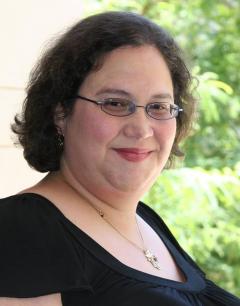ASU professor's book serves as an example of how to disagree, civilly

In 2010, Arizona State University Associate Professor Bertha ManninenBertha Manninen serves as an associate professor of philosophy in the School of Humanities, Arts and Cultural Studies, an academic unit of ASU's New College of Interdisciplinary Arts and Sciences. wrote an article on the topic of abortion for the American Journal of Bioethics. In the article, Manninen addressed from a pro-choice standpoint the possibility of the passage of so-called “Human Life Amendments,” which would extend the definition of personhood to encompass newly fertilized eggs.
When the journal asked her to suggest a colleague who could provide a counterargument, she didn’t have to think twice. As grad students at Purdue, she and Jack Mulder, now a professor of philosophy at Hope College in Michigan, were officemates with opposing viewpoints on several social issues.
“That gave us plenty of opportunities to argue over the years,” Manninen said, however respectfully, and the two developed a friendship despite their differing opinions.
In 2014, they recorded a debate on abortion for a website called Philosophy TV, with Manninen taking the pro-choice position and Mulder taking the pro-life position. Afterward, they joked that they should write a book about it.
Now they have.
The authors hope the recently published “Civil Dialogue on Abortion” will serve as an example to others of how to have a respectful, constructive argument with those we disagree with. Manninen spoke with ASU Now about the nuances and benefits of such an undertaking.
Editor's Note: Responses have been edited for length and clarity.
Bertha Manninen
Question: In the intro to the book, you and Mulder write that “there is simply no substitute for earnest dialogue and, indeed, friendship across ideological lines.” How have you two been able to remain respectful and friendly given your disagreements?
Answer: I have lots of friends with whom I have really deep disagreements on issues that tear most people apart — religion, politics, etc. The common denominator for us being able to talk to each other in a way that we’re not just resorting to meanness is that we have this assumption of goodwill toward each other. When you know someone personally, it becomes harder to write them off.
Q: What about when you don’t know the person you disagree with?
A: It’s harder to do with people we don’t know because we all have our prejudices and we make assumptions about each other, but you have to try to just begin with the common assumption that most people are good people. That’s become really hard to do but precisely because it’s become so hard to do, we need to be willing to at least start there.
That kind of thinking has been very handy as a teacher because in the classroom you can’t get angry, you have to be patient and you have to listen. Even if a student says something I don’t agree with, I have to force myself to look at the reasons behind what they’re saying and ask them to do the same. I think most people, when you actually listen to what they have to say, have good reasons behind their position, or reasons that you can at least understand from their point of view. Once you acknowledge to them that you don’t think they’re completely wrong, they’re more receptive to having a conversation about it. I teach ethics and religion, and those can be controversial topics, so I tell my classes, "We’re going to listen to each other. We don’t have to agree but we have to at least listen."
Q: Some people think if they haven’t changed someone’s mind, they’ve failed in arguing their point. Is it wrong to think that way?
A: Something Jack and I don’t do is we don’t compromise. It’s possible to still retain your position but also have empathy or compassion for the opposing side. That can genuinely change how you debate. With something like immigration, especially in a state like Arizona, it seems like it’s almost impossible to have that debate with someone on the street without it devolving really quickly into callous or racist comments. But if we listen to each other, it’s possible to gain an added layer of compassion that at the very least, even if it doesn’t change your position, changes the language of the debate.
Morgan Spurlock, who made the documentary “Super Size Me,” has a show called “30 Days,” where he takes people with opposing viewpoints and makes them live with each other for 30 days. There’s an episode on immigration where a modern-day Minuteman (who is also an immigrant from Cuba), who is against illegal immigration has to live in a house with undocumented immigrants for 30 days. By the end of it, his position on illegal immigration hasn’t changed but you can tell his attitude is different; he’s not as violently opposed to it and is more understanding of why people do it. Just the fact that his demeanor has softened so drastically shows he realizes there are nuances to the issue.
Q: Were you and Mulder able to reach any such understandings on the topic of abortion?
A: There’s a chapter we wrote together where we talk about ways of dealing with the issue of abortion that might be more fruitful for both sides. There are Nordic countries that have very low instances of abortion rates, so we go over what those countries are doing and consider if it would be possible to emulate that here in the U.S. Things like increasing access to contraception, less sexual shaming and more responsible sex-ed programs. (Arizona does not require schools to teach sex education.) America sometimes gets a little too caught up in its exceptionalism and doesn’t want to look to other countries for examples but considering other viewpoints can lead to real progress.
More Arts, humanities and education

ASU professor's project helps students learn complex topics
One of Arizona State University’s top professors is using her signature research project to improve how college students learn science, technology, engineering, math and medicine.Micki Chi, who is a…

Award-winning playwright shares her scriptwriting process with ASU students
Actions speak louder than words. That’s why award-winning playwright Y York is workshopping her latest play, "Becoming Awesome," with actors at Arizona State University this week. “I want…

Exceeding great expectations in downtown Mesa
Anyone visiting downtown Mesa over the past couple of years has a lot to rave about: The bevy of restaurants, unique local shops, entertainment venues and inviting spaces that beg for attention from…


